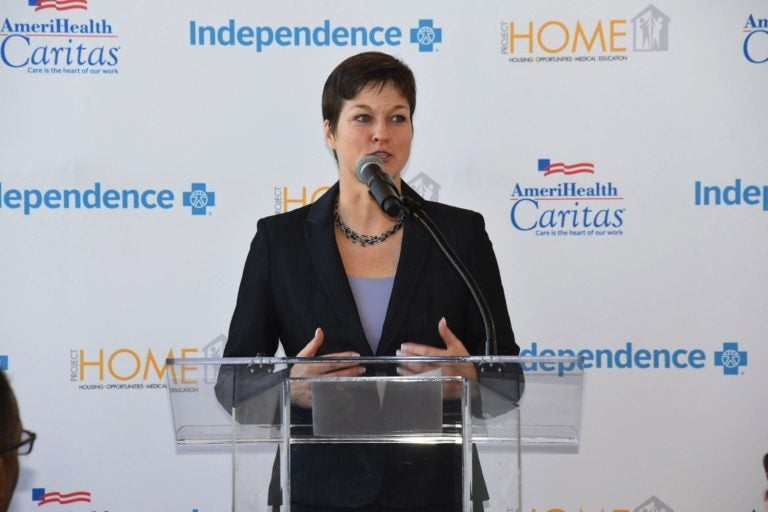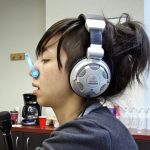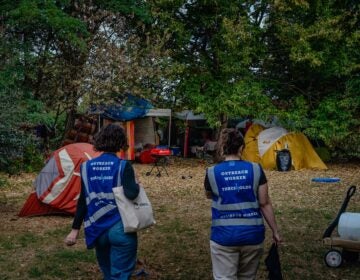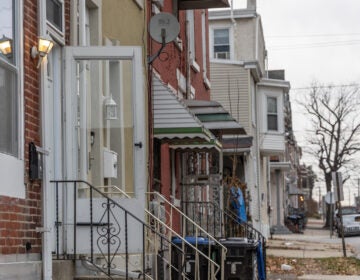Project HOME, insurance companies seek to alleviate harm caused by poverty
Project HOME, Independence Blue Cross and AmeriHealth Caritas unveiled a 3-year, $1 million initiative to offer services to reduce the harm of poverty.

Teresa Miller, secretary of the Pennsylvania Department of Human Services, talks about a new program aimed at improving health in North Philadelphia, where 45% of residents in that area live at or below the poverty level. (HughE Dillon/Project Home)
A new program aims to improve the health of North Philadelphians by providing services — such as affordable child care, job opportunities and transportation — that it hopes will reduce the harm caused by poverty.
“Things like food access, employment status, educational level, access to affordable transportation,” said Teresa Miller, secretary of the Pennsylvania Department of Human Services. “Barriers to mitigate any of these social determinants of health can impact an entire community, and they can create serious disparities in health equity, as we know. Unfortunately, these health disparities exist around Pennsylvania, and we have found that they are particularly concentrated right here in North Philadelphia.”
The three-year, $1 million initiative was unveiled Friday by Project HOME, a Philadelphia nonprofit focused on poverty issues, along with the insurance companies Independence Blue Cross and AmeriHealth Caritas, which are funding the project.
Called “Keystone Connection to Wellness,” the effort will target parts of lower North Philadelphia that fall within the zip codes 19121 and 19132.
Household income data shows that 45% of residents in that area live at or below the poverty level — making it the poorest neighborhood in the city.
“Everywhere you look, there’s a crane building a new building. There’s jobs coming to this city,” said Dan Hilferty, CEO of Independence Blue Cross. “But yet we’re the poorest [big] city in the United States of America. Twenty-six percent of our citizens live in poverty. It’s not right.”
For residents of the two zip codes, that poverty translates to some of the worst health, including an average life expectancy of 69 — almost 20 years shorter than that of their wealthier neighbors — and an infant mortality rate that is 125% of the national average.
“All of those statistics are unacceptable,” said Monica Medina McCurdy, vice president for health care services at Project HOME. “We need to really address that and get at the root causes of it.”
How the program does that, McCurdy said, will depend in part on the community.
“We want it to be a data-driven project as well as a community-driven project,” she said.
To achieve both, a series of meetings will take place with local residents to gather information and opinions. The idea is to form a community advisory board that can help plan and guide the program’s priorities.
“We want to be accountable to them and we want them to be involved in how it’s going to take shape,” McCurdy said.
Based on those recommendations, the program will start offering services that its organizers say they hope can disrupt the connection between poverty and health disparities. That might include child care, food security, transportation, housing, behavioral health services, and employment opportunities.
The organizers said they hope to launch their first services in as few as three months. They estimated that it could affect 1,250 people in the project’s first year.
McCurdy said the project also has political aspirations.
“I know … some of this stuff feels sometimes like it’s a Band-Aid to a larger problem,” she said. “So one of the things that I really appreciate [is] what Sister Mary [Scullion, executive director of Project HOME] said, which is really what we’re all about … addressing the fundamental public policy issues that prevent people from escaping poverty in the first place.”
To participate, or find out more, neighborhood residents can visit one of Project HOME’s three North Philadelphia locations: the Stephen Klein Wellness Center, the Honickman Learning Center and Comcast Technology Labs, and the Helen Brown Community Center.
 WHYY is one of over 20 news organizations producing Broke in Philly, a collaborative reporting project on solutions to poverty and the city’s push towards economic justice. Follow us at @BrokeInPhilly.
WHYY is one of over 20 news organizations producing Broke in Philly, a collaborative reporting project on solutions to poverty and the city’s push towards economic justice. Follow us at @BrokeInPhilly.
WHYY is your source for fact-based, in-depth journalism and information. As a nonprofit organization, we rely on financial support from readers like you. Please give today.





